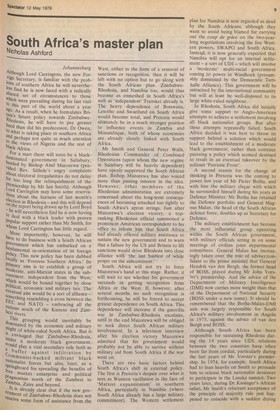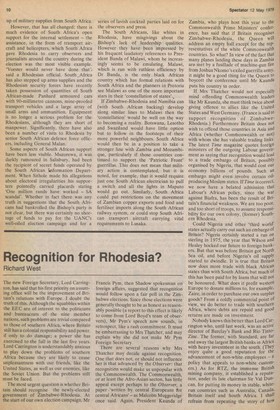South Africa's master plan
Nicholas Ashford
Johannesburg
Although Lord Carrington, the new Foreign Secretary, is familiar with the prob lems of southern Africa he will neverthe less find he is now faced with a radically altered set of circumstances to those which were prevailing during his last visit to this part of the world about a year age. As a result, when he formulates Britain's future policy towards ZimbabweRhodesia, he will have to pay greater heed than did his predecessor, Dr Owen, to what is taking place in southern Africa and perhaps not quite as much attention to the views of Nigeria and the rest of black Africa. For a start there will soon be a blackclftinated government in Salisbury, liFaded by Bishop Abel Muzorewa (provided Rev. Sithole's angry complaints about electoral irregularities do not delay for too long the relinquishment of the Premiership by Mr Ian Smith). Although '-.0rd Carrington may have some reservations about the fairness of last month's election in Rhodesia and this will depend O n the report being drawn up by Lord Boyd he will nevertheless find he is now having to deal with a black leader with proven P°Polar support rather than Mr Smith, for Whom Lord Carrington has little regard. More importantly, however, he will I. to do business with a South African government which has embarked on a fundamental re-orientation of its foreign Policy. This new policy has been dubbed 1°cally as 'Fortress Southern Africa.' Its Primary aim is to establish a group of Moderate, anti-Marxist states in the subcontinent, independent from the West, Which would be bound together by close Political, economic and military ties. The eventual aim would be a sort of alliance something resembling a cross between the EC and NATO embracing all the nations south of the Kunene and Zambezi rivers. This grouping would inevitably be dOminated by the economic and military might of white-ruled South Africa. But it is envisaged that Zimbabwe-Rhodesia, under a moderate black government, Would play a vital secondary role both as a buffer against infiltration by CoMmunist-backed militant black nationalist forces but also, later, as a sfpringboard for spreading the benefits of tee market enterprise and political Pragmatism north of the Zambezi to Zambia, Zaire and beyond. It is already clear that if the new government of Zimbabwe-Rhodesia does not receive some form of assistance from the West, either in the form of a removal of sanctions or recognition, then it will be left with no option but to go along with the South African plan. ZimbabweRhodesia, and Namibia too, would thus become as enmeshed in South Africa's web as 'independent' Transkei already is. The heavy dependence of Botswana, Lesotho and Swaziland on South Africa would become total, and Pretoria would ultimately be in a much stronger position to influence events in Zambia and Mozambique, both of whose economies are already closely linked with South Africa.
Mr Smith and General Peter Walls, Rhodesian Commander of Combined Operations (upon whom the new regime in Salisbury will be heavily dependent) have openly supported the South African plan. Bishop Muzorewa has also voiced more than passing interest in the idea. However, other members of the Rhodesian administration are extremely concerned about the long-term consequences of becoming attached too tightly to South Africa's apron strings. Just after Muzorewa's election victory, a topranking Rhodesian official summoned a prominent American correspondent to his office to inform him that South Africa had already offered military assistance to sustain the new government and to warn that a failure by the US and Britain to lift sanctions would drive Rhodesia into close alliance with 'the last bastion of white power on the subcontinent.'
South Africa will not try to force Muzorewa's hand at this stage. Rather, it will wait to see whether his government succeeds in getting recognition from Africa or the West. If, however, after several months no such recognition is forthcoming, he will be forced to accept greater dependence on South Africa. This dependence will increase if the guerrilla war in Zimbabwe-Rhodesia escalates, until in the end Muzorewa will be obliged to seek direct South African military involvement. In a television interview after his election victory Muzorewa admitted that his government would probably not be able to survive without military aid from South Africa if the war went on.
There are two basic factors behind South Africa's shift in external policy. The first is Pretoria's despair over what it sees as Western vacillation in the face of 'Marxist expansionism' in southern Africa, particularly in Namibia (where South Africa already has a large military commitment). The Western settlement plan for Namibia is now regarded as dead by the South Africans, although they want to avoid being blamed for carrying out the coup de grace on the two-yearlong negotiations involving the five Western powers, SWAPO and South Africa. Instead, it is now generally expected that Namibia will opt for an internal settlement a sort of UDI which will involve a 'moderate' multi-racial government coming to power in Windhoek (presumably dominated by the Democratic Turnhalle Alliance). This government will be ostracised by the international community but will at least be well-disposed to its large white-ruled neighbour.
In Rhodesia, South Africa did initially give some support to Anglo-American attempts to achieve a settlement involving all black nationalist groups. But after these attempts repeatedly failed, South Africa decided it was best to throw its support behind a solution which would lead to the establishment of a moderate black government, rather than continue pursuing a policy which seemed destined to result in an eventual takeover by the militant 'Patriotic Front'.
A second reason for the change of thinking in Pretoria was the coming to power last year of Mr Pieter Botha, and with him the military clique with which he surrounded himself during his years as Defence Minister. Mr Botha has retained the Defence portfolio and General Magnus Malan, the head of the South African defence force, doubles up as Secretary for Defence.
The military establishment has become the most influential group operating within the South African government, with military officials sitting in on some meetings of civilian joint departmental committees. General Malan has increasingly taken over the role of adviser/confidant to the prime minister that General Hendrik van den Bergh, the former head of BOSS, played during Mr John Vorster's premiership. And the advice of the Department of Military Intelligence (DMI) now carries more weight than that of the Department of National Security (BOSS under a new name). It should be remembered that the Botha-Malan-DMI axis was largely responsible for South Africa's military involvement in Angola in 1975, against the advice of van den Bergh and BOSS.
Although South Africa has been responsible for sustaining Rhodesia during the 14 years since UDI, relations between the two countries have often been far from cordial, particularly during the last years of Mr Vorster's premiership. In 1974, for example, South Africa had to lean heavily on Smith to persuade him to release black nationalist detainees to participate in the Lusaka summit. Two years later, during Dr Kissinger 's African safari, Mr Smith's reluctant acceptance of the principle of majority rule just happened to coincide with a sudden drying up of military supplies from South Africa.
However, that has all changed: there is much evidence of South Africa's open support for the internal settlement — the assistance, in the form of transport aircraft and helicopters, which South Africa gave Rhodesia to carry observers and journalists around the country during the election was the most visible example. -Vorster would never have done that', said a Rhodesian official. South ,Africa has also stepped up arms supplies and the Rhodesian security forces have recently taken possession of quantities of South African-made Panhard armoured cars with 90-millimetre cannons, mine-proofed transport vehicles and a large array of small arms and ammunition. Equipment is no longer a serious problem for the Rhodesians, although they are short of manpower. Significantly, there have also been a number of visits to Rhodesia by senior South African defence force officers, including General Malan.
Some aspects of South African support have been less visible. Muzorewa, it was darkly rumoured in Salisbury, had been the recipient of secret funds operated by the South African nformation Department. When Sithole made his allegations about electoral irregularities his supporters pointedly carried placards stating One million rands have worked — SA scandal'. Whether in fact there was any truth in suggestions that the South Africans had bankrolled the Bishop's party is not clear, but there was certainly no shortage of funds to pay for the UANC's well-oiled election campaign and for a series of lavish cocktail parties laid on for the observers and press.
The South Africans, like whites in Rhodesia, have misgivings about the Bishop's lack of leadership qualities. However they have been impressed by his frequent laudatory references to President Banda of Malawi, whom he increasingly seems to be emulating. Malawi, which is run with ruthless efficiency by Dr Banda, is the only black African country which has formal relations with South Africa and the planners in Pretoria see Malawi as one of the more important stars in their 'constellation of states'., If Zimbabwe-Rhodesia and Namibia can (with South African backing) develop along similar lines to Malawi then the 'constellation' would be well on the way to becoming a reality. Botswana, Lesotho and Swaziland would have little option but to follow in the footsteps of their more powerful neighbours. South Africa would then be in a position to take a stronger line with Zambia and Mozambique, particularly if those countries continued to support the 'Patriotic Front' guerrillas. This does not mean that military action is contemplated, but it is noted, for example, that it would require just one South African electrician to pull a switch and all the lights in Maputo would go out. Similarly, South Africa could put restrictions on the movement of Zambian copper exports and food and fertiliser imports along the South African railway system, or could stop South African transport aircraft carrying vital requirements to Lusaka.



































 Previous page
Previous page